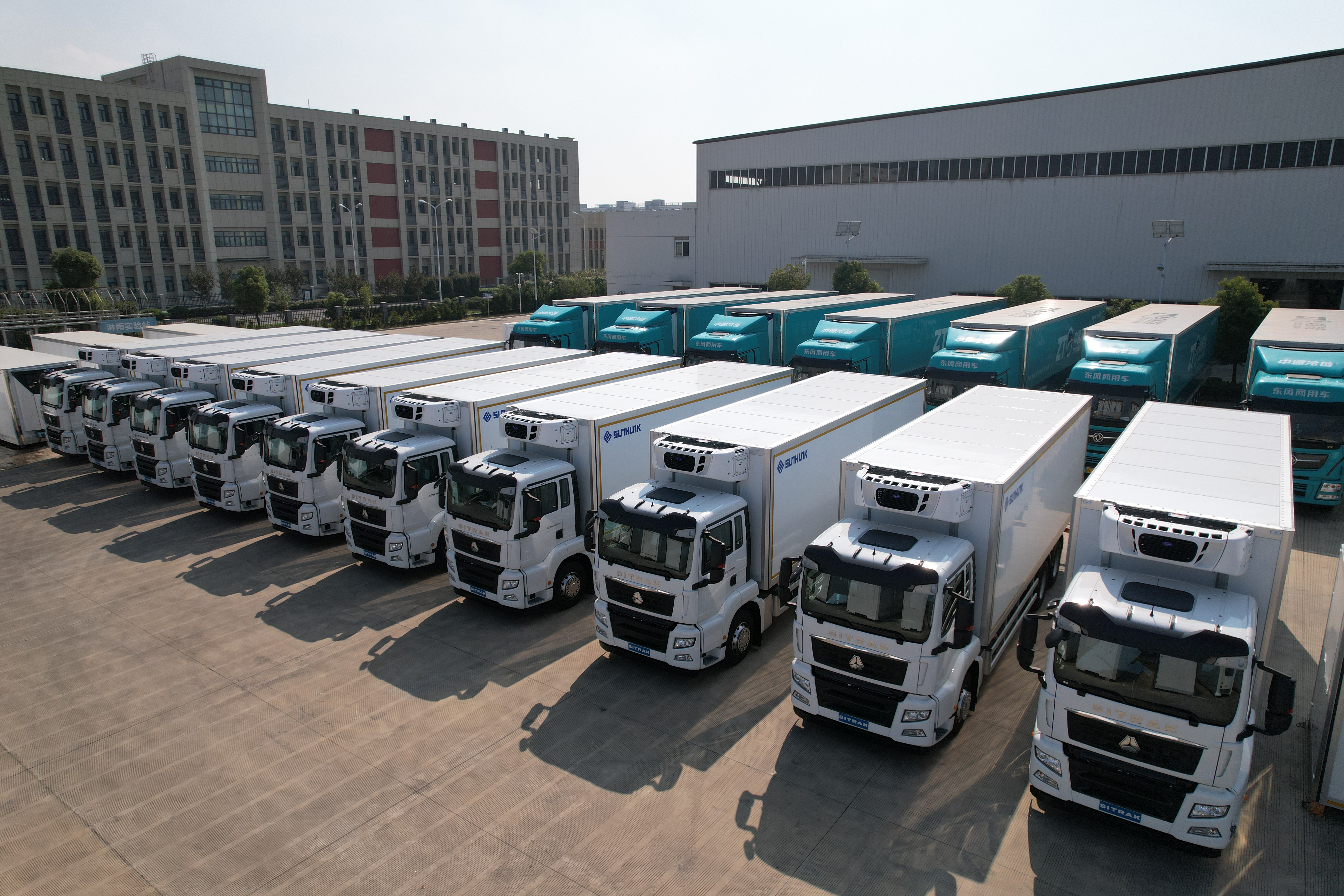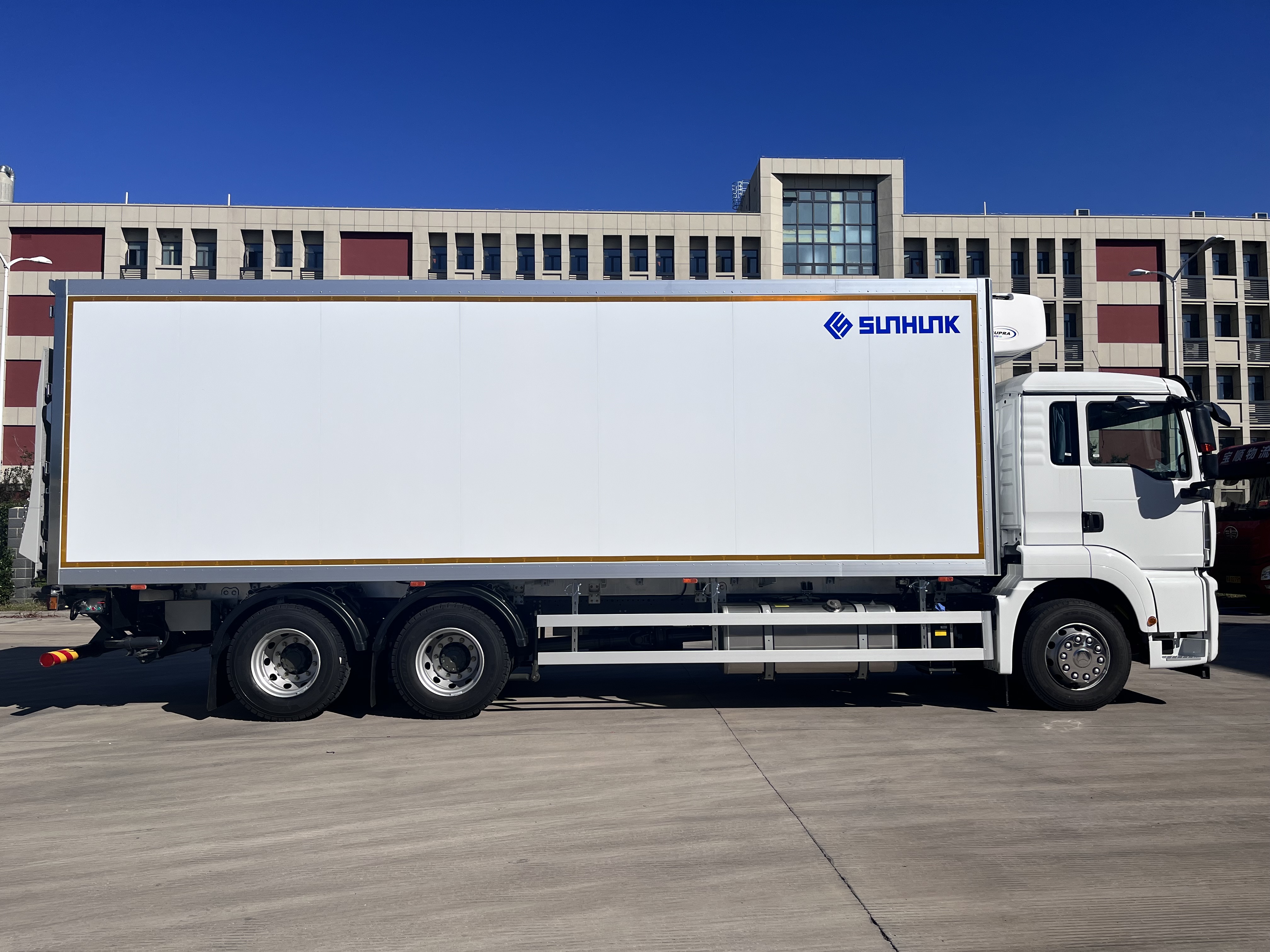- PRODUCTS
- SOLUTION
- SERVICE
- NEWS
- ABOUT US
The main difference between reefer trucks and freezer trucks lies in their temperature control range. We can provide reefer trucks for such needs, maintaining temperatures between 0°C and 8°C. Our primary customers are fresh produce farmers, and vegetable or fruit transporters can always rely on top-notch reefer trucks for on-time deliveries. Meanwhile, freezer trucks maintain temperatures between -18°C and -25°C, used for interstate transport of frozen foods. Freezer trucks are equipped with dual-stage refrigeration systems with a cooling capacity exceeding 10,000 watts, while reefer trucks have a cooling range between 3 to 7 kWh. The operation methods are also different, with freezer trucks involving more rigorous temperature monitoring and management.
The temperature range of reefer trucks is 0°C to 8°C, which is very suitable for preserving low-temperature fresh foods and pharmaceuticals. This temperature range acts as a freezing mechanism, extending the shelf life of products and slowing down the growth of bacteria. According to industry data, reefer trucks can extend the freshness of food by 2 to 3 times, significantly reducing spoilage.
High-end reefer trucks are equipped with precise temperature control systems, capable of maintaining temperatures within a smaller range, usually within ±0.5°C. This precision is particularly beneficial for transporting high-quality foods and pharmaceuticals that require specific temperature conditions. Some sensitive drugs must be transported at a temperature of 5°C, and reefer trucks excel in maintaining the required coldness due to their precise temperature control capabilities, thus upholding quality standards.
For freezer trucks, maintaining a temperature range of -18°C to -25°C within the compartment is more strictly controlled. This low-temperature environment helps prevent food from thawing during transport, effectively ensuring product quality. The low-temperature environment of freezer trucks can extend the shelf life of frozen meat to 12 months or longer, while traditional transport may cause quality issues within 3 to 6 months. Special trucks can reduce the temperature to -30°C, used for transporting foods or other products that are extremely sensitive to temperature.

Reefer trucks are the first choice for urban distribution and short-distance transport, typically covering distances of 50 to 500 kilometers. They are frequently shuttling between large supermarkets, restaurants, and distribution centers, accounting for over 60% of urban distribution transport. Their versatility and speed make them a popular choice for transporting fresh items, which have shorter shelf lives and typically need to be delivered within 12 hours.
On the other hand, freezer trucks are often used for long-distance transport and cross-regional distribution, typically covering distances over 500 kilometers. Freezer trucks are particularly suitable for long-distance interstate and even international transport of frozen meat, seafood, and ice cream. Freezer trucks are widely used in international logistics, especially in sea and air transport, where they can transport deep-frozen goods from production sites to global markets. According to statistics, freezer trucks account for up to 70% of medium and long-distance transport, making them an indispensable part of cold chain logistics.
The cooling capacity of reefer trucks ranges from 3,000 to 7,000 watts, sufficient to meet the needs of fresh food preservation. Reefer trucks require rapid cooling and temperature control, so they use a simple but fast-acting single-stage compressor system. The average temperature recovery time for reefer trucks after opening doors to load/unload goods is about 10 minutes, ensuring that goods are not affected by temperature fluctuations within the time required to restore to the set temperature.
Freezer trucks, on the other hand, are designed for heavy-duty use and typically opt for dual-stage compressor systems capable of handling 10,000 watts to 15 kilowatts or more. This system can quickly lower the compartment temperature to the specified value and maintain long-term reliability under high-temperature conditions. The compressors and condensers in freezer trucks typically have a lifespan of 8 to 10 years, compared to the 5 to 7 years for standard reefer trucks, making them a safe investment in the long run.
Reefer trucks offer a more cost-effective solution, with average fuel consumption of around 20 to 30 liters per 100 kilometers, depending on vehicle model and transport conditions. The purchase price of a reefer truck usually ranges between 200,000 to 500,000 yuan, with lower maintenance costs, making them more suitable for frequent short-distance transport tasks. The annual operating costs of a reefer truck, including fuel, maintenance, and insurance, are about 50,000 to 100,000 yuan, making them a financially wise choice.
Freezer trucks have higher operating costs, with average fuel consumption typically ranging from 35 to 45 liters per 100 kilometers due to their powerful refrigeration systems and thick insulation materials. The purchase price is about 300,000 to 700,000 yuan. Additionally, freezer trucks have relatively high maintenance costs, with annual operating expenses potentially reaching 80,000 to 150,000 yuan. However, since freezer trucks can transport high-value frozen foods, their higher operating costs are often offset by transporting high-profit goods, making them a lucrative investment.

Reefer trucks usually come with 3 to 4 temperature sensors that can track the current temperature in the compartment at any time and transmit all data to the control panel on the dashboard. Most of the time, reefer trucks can operate within a temperature fluctuation range of ±2°C, meeting the needs of over 90% of fresh food transportation.
Freezer trucks, on the other hand, are typically equipped with 6 to 8 temperature sensors evenly distributed within the compartment to cover all four corners, providing accurate temperature readings. The temperature monitoring system of freezer trucks is generally remote, allowing managers to view real-time temperature changes within the compartment via the network. Some high-end freezer trucks are equipped with an automatic alarm system, where an alert is automatically sent when the temperature exceeds the set range, enabling timely handling of the problem.